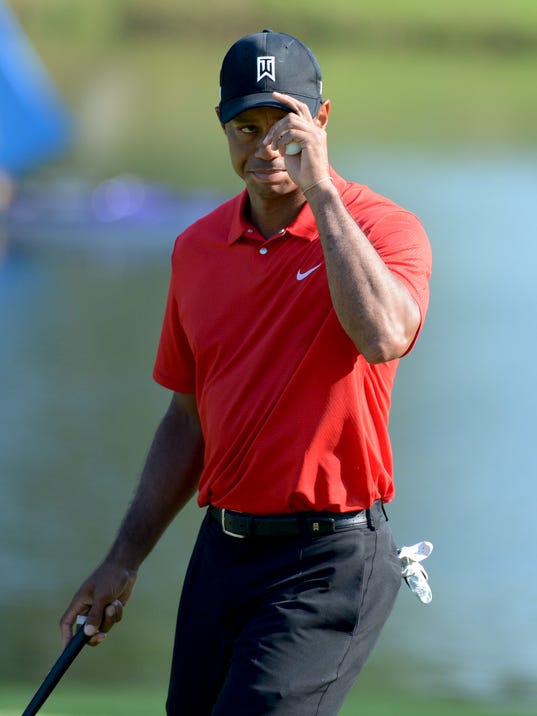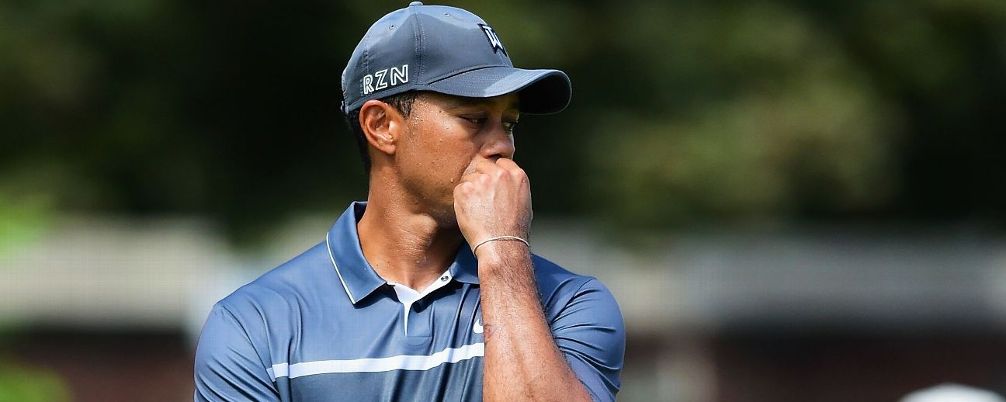Roundup And Reminder: Tiger At 40
/If Tiger Woods needs motivational material, he should look no further than the obituaries stories posted today for his 40th birthday.
Bleak!
Well, not entirely. But the annual ritual that is golf writers penning one more possible GWAA-award worthy column did take on more of a post-mortem vibe after Tiger's depressing press conference in the Bahamas and the realization that he's had three back surgeries in a year. Nonetheless, there were some creative and thought-provoking efforts. The ones I enjoyed reading with highlights, though as always, I'd encourage you to click the links...
 Steve DiMeglio reflects on the state of Woods and while he felt the mood brightened later in the week, had to note the Woods press conference as a low point for fans of the golfing great.
Steve DiMeglio reflects on the state of Woods and while he felt the mood brightened later in the week, had to note the Woods press conference as a low point for fans of the golfing great.
When he did talk golf at the Hero World Challenge, the tournament which benefits his foundation, it sure sounded like his playing days are over. In an uncharacteristically revealing news conference, the man with 14 majors and 79 PGA Tour titles painted a bleak future with a steady stream of telling comments.
Downtrodden and in obvious pain, Woods said there was no timetable for his return to the game, no light at the end of his tunnel. He said everything beyond this “will be gravy.” He’s looking forward to the 2016 Ryder Cup as an assistant captain (if he doesn’t play his way on to the team).
The Guardian's Ewan Murray wonders if Tiger's ever recovered from his scandal.
What does seem a fair analysis is that the sudden realisation that he was not infallible, either on or off the course, had a profound impact on Woods. Not only was he susceptible to the temptations and weaknesses of so many others, Woods had to carry out a supposed rehabilitation process, by way of the most cringe-inducing public apology in history, in front of the watching world.
Woods single-handedly dragged golf into a fresh commercial stratosphere, a matter not lost on the leading players of 2015 as they pursue multimillion-pound prizes week after week. When Tiger’s father, the late Earl Woods, insisted to anyone who would listen and plenty who would not that his son was going to revolutionise the game, it was portrayed as fantasy. Earl was right. Woods emerged as a sporting phenomenon.
Eternal optimist James Corrigan sees light at the end of the tunnel for Woods if post-40 career resurgences are any indication.
If he can feel like a proper, fit 40-year-old then the history of golf shows that his career does not have to be over. Woods evidently still wants to compete, but has allowed himself the privilege of looking back. In 20 years, he redefined his sport, broke down some of its barriers and brought so much pleasure and awe to so many. It is intriguing to read what he judges to have been his finest achievements.
Christine Brennan sees Woods turning 40 going on 70.
Just as Tiger was in a hurry to win majors, it turns out he also was in a rush to reach middle age. Not by choice, of course, but it appears to have been inevitable, considering how he lived his life outside of golf, how he contorted his body to make a golf ball do what he wanted it to do (putting tremendous pressure on a back that eventually couldn’t take it anymore), how he drove himself so hard so fast that he has driven himself right out of the game he once dominated, at least for the time being.
Mercer Baggs has warm memories of the younger Woods around Orlando and at Golf Channel.
Tiger’s talked a lot over the last two decades. Did you know he has 1,364 transcripts on asapsports.com since 1996? That’s about 72 transcribed interviews a year during that span. Well more – over 200 more – than Phil Mickelson has given in a greater time frame. And that only counts when a stenographer was around.
Back in the day, the early professional days, Tiger regularly came into Golf Channel studios. He did interviews. He even viewed tape. We could peek into the window of the library screening room and watch him watch footage of past majors, gleaning knowledge on an unfamiliar venue. We were told not to bug him, and we always kept a respectful distance. Think he drove a Mercedes.
Tiger seemed relatable back then. Like, if you just introduced yourself that would lead to a chat.
Ryan Lavner on why Tiger still matters, talking to some interesting folks about what makes Woods different, and how he impacted college golf and motivated the kids in spite of the hat he wore on Golf Talk Live.
Rex Hoggard wonders where Tiger goes from here and includes this from Arnold Palmer:
But as Palmer eyed that fateful cover from 1969, the conversation turned to Woods and his impending birthday. The signature smile vanished, replaced by the slightest hint of sadness.
“I’m afraid some of my thoughts about Tiger and his life and his future might be different. There are things that would be unfair, to him, for me to say,” Palmer said. “He has an opportunity and a talent that is something he should value more than he does.”
Jason Sobel talks to Jack Nicklaus, who is more optimistic given his post-40 career.
"Forty was just a number for me," he explained. "It really didn't make any difference. The hardest birthday I had was 65, because I knew 65 was the year I wasn't going to play anymore."
If you're looking for a group of golfers to take pity on Woods for hitting the Big Four-Oh, don't look to those who have already passed that benchmark, because most will simply echo Nicklaus' sentiments about the occasion.
Golf Central’s Tiger at 40 special airs at 6 and 11 pm ET today. Here's a preview where Rich Lerner, Brandel Chamblee, Jaime Diaz and Tim Rosaforte talk about moments that stand out from Tiger's career.
 **Bob Harig added his thoughts, including this on the prospects of Tiger excelling in his 40s.
**Bob Harig added his thoughts, including this on the prospects of Tiger excelling in his 40s.
Age 40 saw Nicklaus win two majors in 1980 at the U.S. Open and the PGA. And there are numerous players today competing in their 40s, including Jim Furyk, 45, Phil Mickelson, 45, and Lee Westwood, 42. Along with Thongchai Jaidee, Jamie Donaldson and Soren Kjeldsen, they are the only players age 40 and older ranked among the top 50 in the world.
And while Ben Hogan and Gary Player won majors in their 40s, Arnold Palmer and Tom Watson did not.
GolfChannel.com's Justin Ray's forty for forty stats are fun. Here's a particularly good stretch:
38. Woods won 10 majors before his 30th birthday. Since the first Masters was held in 1934, the only player to even win five majors before turning 30 was Jack Nicklaus, who won seven.
37. On that note: today, there is currently only one player with double-digit PGA Tour wins (not majors, just regular victories) under age 30: Rory McIlroy.
36. In majors from 1997 through 2008, Tiger recorded 34 different rounds of 67 or better. No other player had more than 16 such rounds in that span.
35. Woods won 46 times in his 20s, 16 more than any other player in PGA Tour history (Nicklaus, again, is second). During the time Woods was in his 20s, the player with the second-most victories before age 30 was David Duval, with 13.











